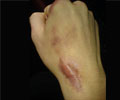Researchers at the Tel Aviv University have developed a revolutionary new wound dressing, that can not only speed up the healing process of antibiotics but can dissolve when its job is done.
Prof. Meital Zilberman of TAU's Department of Biomedical Engineering has developed a new wound dressing based on fibres she engineered, which can be loaded with drugs like antibiotics to accelerate the healing process, and then dissolve their own.The new study has shown that after only two days, this dressing can eradicate infection-causing bacteria.
The new dressing protects the wound until it is no longer needed, after which it melts away.
"We've developed the first wound dressing that both releases antibiotic drugs and biodegrades in a controlled manner. It solves current mechanical and physical limitations in wound-dressing techniques and gives physicians a new and more effective platform for treating burns and bedsores," said Zilberman.
"Wound dressings must maintain a certain level of moisture while acting as a shield. Like skin, they must also enable fluids from the wound to leave the infected tissue at a certain rate. It can't be too fast or too slow. If too fast, the wound will dry out and it won't heal properly. If too slow, there's a real risk of increased contamination," she added.
The new wound dressing, which does not yet have a formal name, is designed to mimic skin and the way it protects the body.
Advertisement
Unlike oral antibiotics, locally applied antibiotics can target and kill harmful bacteria before they enter the body to cause further infection, sepsis, or death.
Advertisement
The new dressing inhibits bacterial growth and is biodegradable, which helps doctors avoid constant wound cleaning and redressing, allowing the body to do the work on its own.
"When administered at the wound, a doctor can give relatively high but local doses of antibiotics, avoiding any toxicity issues that arise when the same amount of antibiotic passes through the body," explained Zilberman.
To date, her wound dressing has passed physical and mechanical tests in vitro and in bacterial inhibition tests in the laboratory.
The study is published in the Journal of Biomedical Materials Research - Applied Biomaterials.
Source-ANI
RAS











